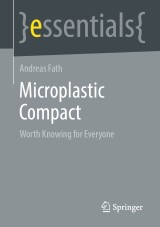Details

Microplastic Compact
Worth Knowing for Everyoneessentials
|
21,39 € |
|
| Verlag: | Springer |
| Format: | |
| Veröffentl.: | 30.09.2022 |
| ISBN/EAN: | 9783658328672 |
| Sprache: | englisch |
| Anzahl Seiten: | 64 |
Dieses eBook enthält ein Wasserzeichen.
Beschreibungen
<p>Will we suffocate in our own plastic waste in the coming years? Or will we manage to turn the corner in time? The constantly growing amount of plastic waste is problematic for the environment and for people who consume the plastic waste in the form of microplastics. The author Andreas Fath explains in a scientifically well-founded but generally understandable way what microplastics are, where they come from and what dangers they pose.</p><div><div>The translation was done with the help of artificial intelligence (machine translation by the service</div><div>DeepL.com). A subsequent human revision was done primarily in terms of content.</div></div>
<p>Microplastics.- definition, origin and use.- effects of microplastics.- countermeasures.- prevention, degradation and recycling.</p>
<p>Prof. Dr. Andreas Fath started his professional career at the KIT in the Institute of Microstructure Technology with the development, process management, and process control of alloy electroplating for microforming, before he was responsible for new developments of products, processes, and surfaces as chief chemist in industry for many years. In 2011 he received the Fraunhofer UMSICHT science prize for an electrochemical process for PFT degradation. Since 2011 he is professor for physical chemistry at Furtwangen University. Within the project "Rheines Wasser" (Rhine Water), the "floating professor" swam and analyzed the Rhine in a media-effective manner and drew attention to water protection.</p><p><br></p><p>Translated with www.DeepL.com/Translator (free version)</p>
<div>Will we suffocate in our own plastic waste in the coming years? Or will we manage to turn the corner in time? The constantly growing amount of plastic waste is problematic for the environment and for people who consume the plastic waste in the form of microplastics. The author Andreas Fath explains in a scientifically well-founded but generally understandable way what microplastics are, where they come from and what dangers they pose.</div><div><br></div><div>This <i>Springer essential</i> is a translation of the original German 1st edition <i>essentials,</i> <i>Mikroplastik Kompakt </i>by Andreas Fath, published by Springer Fachmedien Wiesbaden GmbH, part of Springer Nature in 2019. The translation was done with the help of artificial intelligence (machine translation by the service DeepL.com). A subsequent human revision was done primarily in terms of content, so that the book will read stylistically differently from a conventional translation. Springer Nature works continuously to further the development of tools for the production of books and on the related technologies to support the authors.</div><div><br></div><div><b>The content</b></div><div><br></div><div><ul><li>Microplastic - definition, origin and use</li><li>Effects of microplastic</li><li>Countermeasures - prevention, dismantling and recycling</li></ul></div><div><b>The target groups</b><br></div><div><br></div><div><ul><li>Anyone who would like to find out more about microplastic</li><li>Students of environmental engineering, biology and chemistry</li></ul></div><div><b>The author</b><br></div><div><br></div><div>Prof. Dr. Andreas Fath started his professional career at the KIT in the Institute of Microstructure Technology with the development, process management, and process control of alloy electroplating for microforming, before he was responsible for new developments of products, processes, and surfaces as chief chemist in industry for many years. In 2011 he received the Fraunhofer UMSICHT science prize for an electrochemical process for PFT degradation. Since 2011 he has been professor of physical chemistry at Furtwangen University. As part of the "Rhine Water" project, the "floating professor" swam through and analysed the Rhine in a media-effective manner and drew attention to water protection.</div><div><br></div>
Current overview of one of the most important major environmental issues Generally understandable, also for interested laymen The author became known as "Rhine swimmer"; he swam the Rhine from its source to its mouth and collected water samples

















